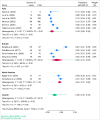Prevalence and assessment tools of cancer-related cognitive impairment in lung cancer survivors: a systematic review and proportional meta-analysis
- PMID: 38441715
- PMCID: PMC10914843
- DOI: 10.1007/s00520-024-08402-9
Prevalence and assessment tools of cancer-related cognitive impairment in lung cancer survivors: a systematic review and proportional meta-analysis
Abstract
Purpose: Cancer-related cognitive impairment (CRCI) is a significant risk factor influencing the quality of life in lung cancer survivors. No absolute assessment tool has been confirmed to assess CRCI in lung cancer survivors. This review was undertaken to pool the overall prevalence of CRCI and to summarize the assessment tools in assessing CRCI among lung cancer survivors.
Methods: PubMed, Cochrane Library, Embase, CINAHL, and CNKI were searched to retrieve articles reported CRCI prevalence. Summary prevalence estimates were pooled using a random effects model, along with corresponding 95% prediction intervals (PIs). The Freeman-Tukey double arcsine transformation of proportions was incorporated in the analysis. Additionally, subgroup analysis, meta-regression, and leave-one-out analysis were performed.
Results: A total of 12 studies, involving 1934 survivors, were included in the review. All of these studies were found to have a low risk of bias in terms of their methodological quality. Four studies (33.3%) utilized the International Cognition and Cancer Task Force (ICCTF) criteria to identify CRCI through neuropsychological tests. The pooled prevalence rate of CRCI was found to be 26% (95% PI, 16-37%), I2 = 95.97%. The region in which the studies were conducted was identified as a significant factor contributing to this heterogeneity (p = 0.013). No indication of small-study effects was found (Egger's test: p = 0.9191).
Conclusion: This review provides an overview of CRCI prevalence and assessment tools in lung cancer survivors. The findings can serve as epidemiological evidence to enhance clinicians' and researchers' understanding of early detection and assessment.
Keywords: Cancer nursing; Cancer-related cognitive impairment; Meta-analysis; Prevalence.
© 2024. The Author(s).
Conflict of interest statement
The authors declare no competing interests.
Figures




Similar articles
-
Risk factors for cancer-related cognitive impairment among individuals with lung cancer: a systematic review and meta-analysis.Support Care Cancer. 2024 Sep 17;32(10):663. doi: 10.1007/s00520-024-08873-w. Support Care Cancer. 2024. PMID: 39287692
-
Cognitive functioning and work-related outcomes of non-central nervous system cancer survivors: protocol for a systematic review with meta-analysis.BMJ Open. 2022 Jul 12;12(7):e060300. doi: 10.1136/bmjopen-2021-060300. BMJ Open. 2022. PMID: 35820744 Free PMC article.
-
Cancer-related cognitive impairment: updates to treatment, the need for more evidence, and impact on quality of life-a narrative review.Ann Palliat Med. 2024 Sep;13(5):1265-1280. doi: 10.21037/apm-24-70. Epub 2024 Sep 9. Ann Palliat Med. 2024. PMID: 39260437 Review.
-
Cancer-related cognitive impairment in survivors of adolescent and young adult non-central nervous system cancer: A scoping review.Psychooncology. 2022 Aug;31(8):1275-1285. doi: 10.1002/pon.5980. Epub 2022 Jul 7. Psychooncology. 2022. PMID: 35726379
-
The Experience of Cancer-Related Cognitive Impairment Across Common Cancers: Protocol for a Qualitative Systematic Review.JMIR Res Protoc. 2024 May 31;13:e56888. doi: 10.2196/56888. JMIR Res Protoc. 2024. PMID: 38820581 Free PMC article.
Cited by
-
Cancer-related cognitive impairment in patients with hematologic malignancies after CAR T cell therapy: a systematic review and meta-analysis of prevalence.Support Care Cancer. 2025 Mar 22;33(4):312. doi: 10.1007/s00520-025-09356-2. Support Care Cancer. 2025. PMID: 40119970 Free PMC article.
-
The Mediating Role of Oxidative Stress on the Association Between Oxidative Balance Score and Cancer-Related Cognitive Impairment in Lung Cancer Patients: A Cross-Sectional Study.Nutrients. 2024 Nov 27;16(23):4090. doi: 10.3390/nu16234090. Nutrients. 2024. PMID: 39683483 Free PMC article.
-
Changes of perioperative cognitive function and its effect on quality of life in laryngeal cancer.Perioper Med (Lond). 2025 Mar 13;14(1):28. doi: 10.1186/s13741-025-00507-x. Perioper Med (Lond). 2025. PMID: 40075433 Free PMC article.
-
Clinical nurses' behavioral intentions to manage cancer-related cognitive impairment in colorectal cancer patients based on the theory of planned behavior: a qualitative study.BMC Nurs. 2025 Jul 4;24(1):845. doi: 10.1186/s12912-025-03515-w. BMC Nurs. 2025. PMID: 40616062 Free PMC article.
-
Neuropsychological and psychosocial assessment of small and non-small lung cancer patients: a study protocol.Front Psychol. 2025 Apr 30;16:1502793. doi: 10.3389/fpsyg.2025.1502793. eCollection 2025. Front Psychol. 2025. PMID: 40370379 Free PMC article.
References
-
- Howington JA, Blum MG, Chang AC, Balekian AA, Murthy SC. Treatment of stage I and II non-small cell lung cancer: diagnosis and management of lung cancer, 3rd ed: American College of Chest Physicians evidence-based clinical practice guidelines. Chest. 2013;143(5 Suppl):e278S–e313S. doi: 10.1378/chest.12-2359. - DOI - PubMed
Publication types
MeSH terms
LinkOut - more resources
Full Text Sources
Medical
Research Materials
Miscellaneous

